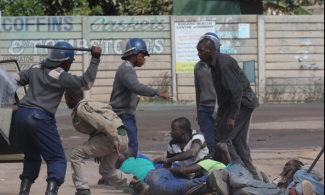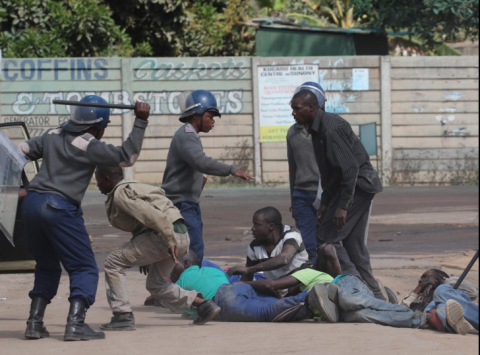
Protesters began assembling at the Beitbridge Border Post, 600km south of Harare, to speak against the implementation of a new law banning basic goods from crossing into Zimbabwe. Several reports said that 77 people were arrested from these demonstrations.
The Republic of Zimbabwe has been shut down due to nationwide protests from government workers and citizens over the deplorable economic decisions made by President Robert Mugabe’s regime. The groundswell of anti-government protests is the highest since the disputed 2008 elections when Mr. Mugabe refused to relinquish power following his loss to the Movement for Democratic Change (MDC) opposition.
Protesters began assembling at the Beitbridge Border Post, 600km south of Harare, to speak against the implementation of a new law banning basic goods from crossing into Zimbabwe. Several reports said that 77 people were arrested from these demonstrations.
Taxi and mini-bus drivers clashed with Zimbabwean police in the country capital Harare on July 4th. The public service drivers accused the police of corruption, saying excessive fines were imposed on their vehicles to raise money for underfinanced police operations across the country.
The Zimbabwe Minister of National Security, Kembo Mohadi, claimed that these protests were the work of a “third force” of outsiders wanting to destabilize the country.
Mr. Mohadi said, “our people are known for holding peaceful demonstrations rather than vandalizing properties or burning tires.”
However, Mr. Mohadi’s statements are contradicted by spokespeople for various activist groups rallying against the economic and political crises across Zimbabwe.
Activists have coalesced in social media platforms calling for the spread of more protests nationwide. Hashtags like #thisflag, #tajamuka and #shutdownzimbabwe2016 have been popular tags for Zimbabweans on social media expressing frustration at the Mugabe government.
#Thisflag reportedly started in April when a video posted by a 39-year-old Harare-based pastor, Evan Mawarire, depicted him expressing his anger towards the Zimbabwe government’s treatment of its citizens. #Tajamuka, a movement led by Patson Dzamara, mobilized dozens of Zimbabweans to occupy Harare's Africa Unity Square. #Shutdownzimbabwe2016, a protest against Mr. Mugabe’s economic policies which have crippled the economy.
Speaking to SaharaReporters in an interview was the spokesman for #tajamuka, Promise Mkwananzi, who told our correspondent that they were not just a social media movement but an action-oriented group working collaboratively with political parties, youth organizations, and other pressure groups.
He said, “we use social media to supplement our actions on the ground.”
Mr. Mkwananzi stated that they are interested in joining forces with any other groups pursuing the goal to have Mr. Mugabe step down as president. He said, “Mugabe refuses to let go of the country and allow the country to move forward.”
He also called for a transitional mechanism be put in place to ensure that there is a truly democratic Zimbabwe. He added that he opposes the use of violence and that “we are not going to go the violent route. We are going to go the peaceful route,” despite being “criminalized for holding peaceful demonstrations.”
Mr. Mkwanazi told SaharaReporters that the government has been making statements that it would ban social media from Zimbabwe users. He noted that social media had become unusually slow and that “we use Facebook and WhatsApp for coordinating our actions so the slow internet will affect our activities.”
The Minister of ICT Supa Mandiwanzira dismissed allegations that the government wanted to ban the use of these platforms, saying that it would only regulate the use these platforms in order to penalize those who abuse social media.
